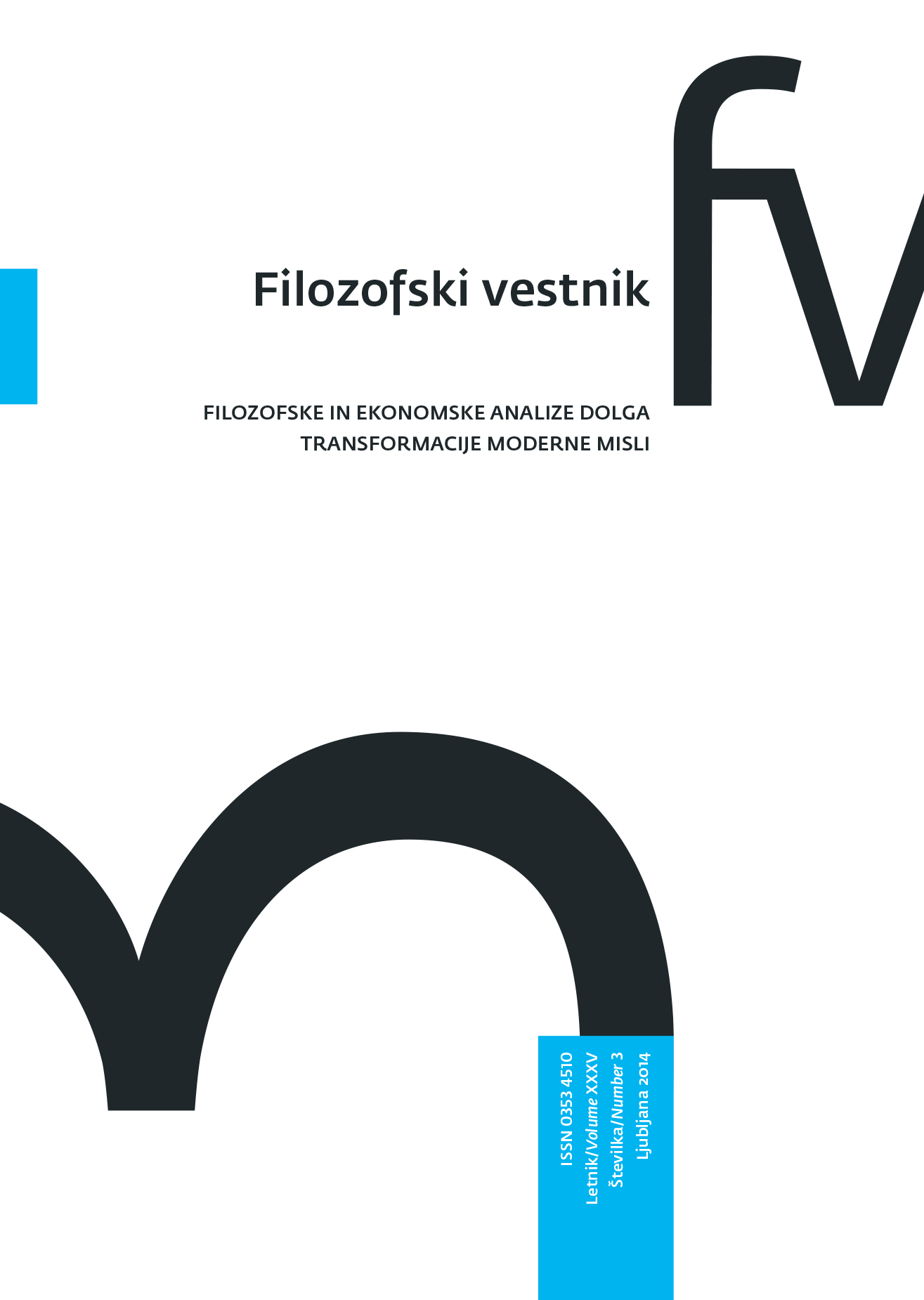Ekonomija dolga: moč nad »načinom življenja«
Ključne besede:
dolg, ekonomija, religija, oblast, biopolitika, Foucault, Agamben, krščanstvoPovzetek
Dolg danes ni le ekonomsko stanje, pač pa neposredno vključuje individualna življenja v širšem smislu in nanje vpliva na nov način. Dolg se kaže kot temelj, skozi katerega projekt ekonomije, osnovane na neoliberalni paradigmi, postane razumljivejši. Stanje dolga nam lahko omogoči, da celoviteje razumemo, v kakšnem smislu, kakor je trdil Michel Foucault, neoliberalizem ni le ekonomska teorija, pač pa tudi oblika vladavine: natanko to, kar je omogočilo preoblikovanje politike v ekonomijo prek tesne povezave med oblastjo in življenjem. Vendar pa je vprašanje, kaj je ekonomija dolga. Odgovor na to vprašanje po mojem mnenju zahteva analizo, ki upošteva vez med ekonomijo in religijo. Če je dolg postal osrednji problem globalne ekonomije (Lazzarato, Graeber), mislim, da bi izvore tega koncepta morali raziskovati s kulturnega, filozofskega in religijskega gledišča hkrati. V tem smislu vprašanje dolga zahteva preučitev odnosa med ekonomsko močjo in človeškim življenjem v vseh njegovih vidikih in soočenje z raziskavo »biopolitike«, ki je od Foucaultovih študij naprej vpeljala raziskovalno polje o problemih sedanje dobe. V zadnjih letih so italijanski filozofi (Agamben, Esposito) pomembno prispevali k razpravi o Foucaultovem konceptu biopolitike. Po mojem mnenju raziskava v tej smeri vključuje preučevanje mehanizmov, ki zadevajo zmožnost človeka, da daje obliko in vrednost svojemu življenju. Zato z mojega stališča ekonomska moč ni le moč/oblast, ki deluje na »golo življenje«, pač pa moč nad »načinom življenja«. Da bi razumeli to poanto, mislim, da je pomembno ponovno premisliti razmerje med religijo in ekonomijo. Po Foucaultovem delu o »krščanski pastoralni oblasti« in »ekonomsko-državni oblasti« je Giorgio Agamben nedavno izvedel raziskavo – ki je še posebej relevantna za mojo analizo – o krščanskih koreninah ekonomije in vladavine. Vendar pa moj cilj ni orisati evolucijsko vez med razvojem krščanske »ekonomije« in zahodnega ekonomskega diskurza niti izslediti, kot bi to hotel Weber, edinstvene korenine ekonomske misli na Zahodu. Prej mislim, da gre za možne in različne zgodovinske realizacije metode, ki je v krščanstvu našla svojo posebno manifestacijo. Tako menim, da ta posebnost krščanskega izkustva dolga – ki je hkrati in od svojega začetka tudi mehanizem oblasti – lahko osvetli sedanji čas.Prenosi
Podatki o prenosih še niso na voljo.
Prenosi
Objavljeno
2016-02-07
Kako citirati
Stimilli, E. (2016). Ekonomija dolga: moč nad »načinom življenja«. Filozofski Vestnik, 35(3). Pridobljeno od https://ojs.zrc-sazu.si/filozofski-vestnik/article/view/4233
Številka
Rubrike
Filozofske in ekonomske analize dolga
Licenca
Avtorji jamčijo, da je delo njihova avtorska stvaritev, da v njem niso kršene avtorske pravice tretjih oseb ali kake druge pravice. V primeru zahtevkov tretjih oseb se avtorji zavezujejo, da bodo varovali interese založnika ter da bodo povrnili morebitno škodo.
Podrobneje v rubriki: Prispevki





